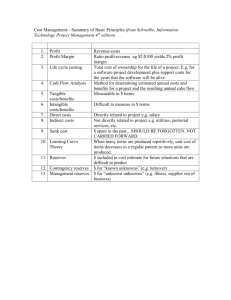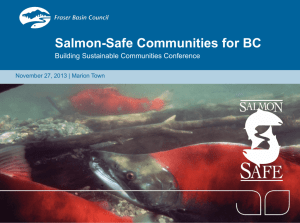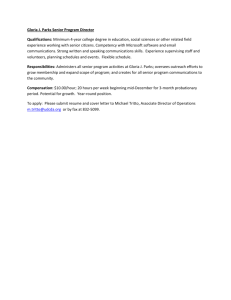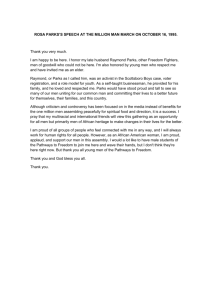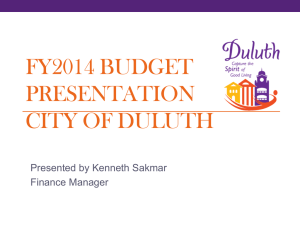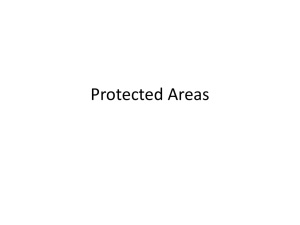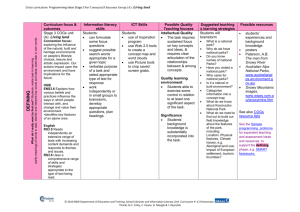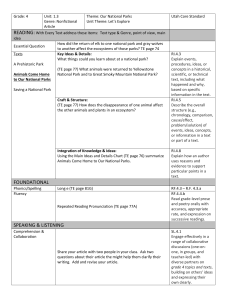10.4 Notes
advertisement
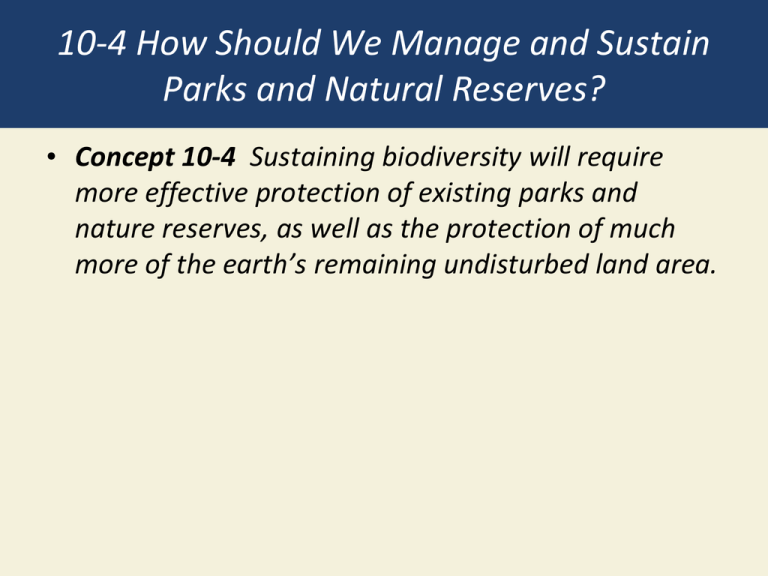
10-4 How Should We Manage and Sustain Parks and Natural Reserves? • Concept 10-4 Sustaining biodiversity will require more effective protection of existing parks and nature reserves, as well as the protection of much more of the earth’s remaining undisturbed land area. National Parks Face Many Environmental Threats • Today we have more than _____________ major 1100 national parks located in more than 120 countries • Parks in ________ - developed countries have the less greatest biodiversity… 1% of these parklands are • But only about _____ protected because park services in these countries do funds not have enough ___________ or ____________ staff • illegal animal poaching • illegal logging and mining Grand Teton National Park • The U.S. national park system, established in 58 1912, has ________ major national parks • Sometimes called our country’s _________ crown jewels _______________ Fig. 10-22, p. 237 Case Study: Stresses on U.S. Public Parks (1) • Biggest problem may be _________________ popularity • Between 1960 and 2008, the number of visitors to U.S. national parks ____________ tripled • • • • Noise Congestion Pollution Damage or destruction to vegetation and wildlife state parks are located near urban areas • Most ________ and receive about __________ twice as many visitors per year as do national parks Natural Capital Degradation: Damage From Off-Road Vehicles • Damage caused by off road vehicles • Controversy over whether these machines should be allowed Fig. 10-23, p. 237 Case Study: Stresses on U.S. Public Parks (2) Additional threats to national parks include… • Damage from _________________ species nonnative • Boars and mountain goats • eat or trample on vegetation...leads to increased soil erosion • Introduced plants, insects, worms enter on vehicle __________ tires or on hikers’ _________ gear • Native species are sometimes __________ or killed _______________ removed • Not all park visitors understand the rules that protect species Case Study: Stresses on U.S. Public Parks (2) • Our parks have also become threatened _____________ of biodiversity islands • Surrounded by a “sea” of commercial development • Nearby human activities threaten the wildlife and recreational value of parks… air • _________ pollution • _________ acid rain • Water ___________________ dispersion 8-9 • Estimated that national parks have an $ ________ billion backlog for long overdue maintenance Science Focus: Reintroducing the Gray Wolf to Yellowstone National Park • Removed species sometimes need to be reintroduced __________________ to national parks for natural restoration capital ________________ • Example: Scientists discovered that the gray keystone wolf was a _____________ species essential for the health of Yellowstone National Park Science Focus: Reintroducing the Gray Wolf to Yellowstone National Park • 1995 and 1996…_______ 31 gray wolves were reintroduced 116 gray wolves • In 2009 the park had ________ higher elevation • Prey on elk and push them to a __________ • _______________ Regrowth of aspen, cottonwoods, and willows • More beaver dams, more _____________, wetlands more aspens • “foundation” species • Compete with and reduced the number of __________ coyotes • Fewer attacks on cattle • More small mammals present in the park Fig. 10-24, p. 239 Nature Reserves Occupy Only a Small Part of the Earth’s Land 13% of our world • Nature reserves occupy about ______ 5% is strictly protected land, but no more than ______ • So in other words… we have reserved 95% of the earth’s land for human use 20% of the • Conservationists’ goal: to protect ______ earth’s land area in a global system that would include multiple examples of all the earth’s biomes ___________ • Protecting more of the earth’s land from unsustainable use will require action and funding by… governments • National ___________________ • ______________ groups Private • _________________ political pressure by concerned Bottom-up individuals Cooperative • _____________________ ventures involving governments, businesses, and private conservation organizations • For example…The _________________ Nature ____________, Conservancy founded in 1951 by a group of professional ecologists, has created the world’s largest system of __________________ held nature privately reserves and wildlife sanctuaries • In the U.S., private, nonprofit _________ _________ land trust ____________ have protected large areas of land groups • Members pool their financial resources and accept tax ___________________ deductible donations to buy and protect farmlands, woodlands, and urban green spaces Silver Creek Nature Conservancy Preserve near Sun Valley, Idaho Fig. 10-25, p. 240 Designing and Connecting Nature Reserves • Large reserves are typically _____________ better than small reserves • Can hold more species and provide greater habitat diversity exposure • they also minimize __________________ to… • natural disturbances (fires and hurricanes) • Invading species • Human disturbances rainforest • This is especially true in tropical _______________ areas…where species diversity is extremely high Designing and Connecting Nature Reserves • Studies of other locales, however, indicate that _____________, ____________-sized reserves may be medium several better protect a broader range of habitats buffer • When possible, scientists call for using the ____________ __________ concept to design and manage nature zone reserves • This means strictly protecting an _________ inner core of a reserve and creating ________________ surrounding buffer zones where locals can use resources sustainably biosphere • So far, the U.N. has created 553 ______________ _______________ with this method reserves Designing and Connecting Nature Reserves • It is also recommended to establish habitat ______________ between isolated reserves to allow corridors migration for species that need large ranges • 2006 study showed that areas connected by habitat higher corridors have ___________________ biodiversity without an increase in nonnative species Case Study: Costa Rica—A Global Conservation Leader • 1963–1983: cleared much of the forest • 1986–2006: forests grew from 26% to 51% • Goal: net carbon dioxide emissions to zero by 2021 • ¼ of land in nature reserves and natural parks – global leader • Earns $1 billion per year in tourism Solutions: Costa Rica: Parks and Reserves—Eight Megareserves Costa Rica • smaller than West Virginia but a biodiversity super power • home to more bird species than found in all of North America mega • Eight _________ _______________ reserves Fig. 10-26, p. 241 Solutions: Costa Rica: Parks and Reserves—Eight Megareserves Government… • pays landowners to maintain or restore _________ tree cover • has planted nearly 14 million trees Conservation has paid off…the country’s largest source of income is _______________ ecotourism Fig. 10-26, p. 241 Protecting Wilderness Is an Important Way to Preserve Biodiversity • One way to protect undeveloped lands from human exploitation is to set them aside as _____________ wilderness • Land officially designated as having no serious disturbance from human activities and where such law activities are limited by _________ • Wilderness Act of 1964…allows government to protect undeveloped public land • These lands get the ______________ highest level of protection from human activities Protecting Wilderness Is an Important Way to Preserve Biodiversity • The Wilderness act is controversial because it… 4.7% of U.S. lands • currently protects only ________ Alaska • ¾ of this land is in _______________ • In the lower 48 states, only 4 areas are ___________ large enough to sustain the species they contain • Great opposition from oil, gas, mining, and timber companies Wrangell - Saint Elias Wilderness Review Questions • Currently, what percentage of earth’s land is strictly protected? 5% • What percentage do conservations suggest we need to protect? 20% • What methods are suggested for designing and connecting nature reserves? Large or medium reserves Buffer zones Habitat corridors Review Questions • What is a wilderness area? Undisturbed, undeveloped land protected by law
